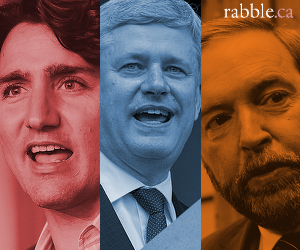Like this article? rabble is reader-supported journalism. Chip in to keep stories like these coming.
Conservative leader Stephen Harper, NDP leader Tom Mulcair, and Liberal leader Justin Trudeau all sought to distinguish themselves from each other during The Globe and Mail‘s leaders’ debate on the economy Thursday night, with each of them sticking to a few repeated talking points in an effort to better clarify their platforms to voters.
Despite the efforts of the moderator, The Globe and Mail editor-in-chief David Walmsley, to keep the leaders responding to the questions he had asked them on jobs, taxes, immigration, infrastructure, debt, housing and more, the leaders were content to quickly run off on tangents that better fit with their communications strategies for debate, the first ever leaders’ debate held in Calgary’s Stampede Park.
Harper repeatedly brought up his record as prime minister over the past decade whenever possible, framing the election as a choice between his untested rivals and his economic stewardship.
Trudeau, on the other hand, made no effort to hide the fact that his party’s platform calls for three years of deficits to fund an infrastructure investment program, clearly repeating that he plans on “modest” deficits to encourage job growth and urban renewal before returning to a surplus. He also made repeated references to Harper’s job creation record as being “the worst since World War II” and growth being the slowest since the Great Depression.
And Mulcair, whose NDP leads in many recent polls but is essentially in a three-way tie with the Liberals and Conservatives, brought up his party’s $15/day child-care plan at every possible opportunity. He also explained that his opposition to new deficits was due to the deficits brought about by the stimulus package from the 2008 recession, saying he didn’t want to saddle future generations with even more debt than is necessary.
Mulcair characterized the Tories’ economic plans as “hitting the snooze button,” while his party would “not hit the panic button” like the Liberals’ deficit, saying that the NDP, “for the first time in our history… is another choice” at the ballot box for voters.
Of course, one federal party leader — the Green Party’s Elizabeth May — was nowhere to be seen on the stage as The Globe and Mail decided not to invite May because the Greens aren’t an “official party,” according to parliamentary rules. However, she was content to add her own feedback via Twitter while hosting an event in Victoria, B.C.
Also absent from the debate was any substantial discussion of issues facing First Nation, Inuit, and Metis people, as they received little more than a sentence from Trudeau and Mulcair, and no mention whatsoever from Harper.
Much of the actual debate of the night hinged on deficits, with Trudeau making the case that with interest rates low and job creation sluggish, it’s a good time for “confident” governments to take out loans to fund “ambitious” programs.
Harper accused Mulcair of taking pages “from the old NDP playbook” of raising taxes on corporations to cover his proposed child-care program while avoiding deficits, suggesting that a federal NDP government would follow similar fiscal policies as provincial counterparts in Manitoba, Ontario, and B.C.
While there were no “knockout punches” in debate — are there ever, really? — there were a handful of testy exchanges on the stage at Stampede Park in Calgary.
When Trudeau claimed that Mulcair’s promises to invest in child care while balancing the budget were “puffs of smoke,” Mulcair retorted, “you’d know all about that, wouldn’t you Justin?,” making reference to Trudeau’s recreational marijuana use and stance on legalization.
At another point, after Harper claimed that his party had made no cuts to social programs during his tenure, Mulcair brought up health-care transfers to the provinces and the fact that the Conservatives raised the age of Old Age Security eligibility from 65 to 67.
The two ended up attempting to talk over one another with neither being understood all that well.
But one offhanded comment made by Harper about the views of “old stock Canadians” on health care for refugees seemed to be burning up social media shortly after the debate.
“We have not taken away health care from immigrants and refugees,” said Harper. “On the contrary. The only time we have removed them is where we have clearly bogus refugee claimants who have been refused and turned down. We do not offer them a better health-care plan than the ordinary Canadian can receive. That’s something that both new and existing and old stock Canadians agree with.”
Neither of the other leaders pressed him on the point during the actual debate, but the line quickly took on a life of its own on Twitter afterward with many questioning just what Harper meant by the term “old stock.”
Mike Barber is a freelance writer and editor in Toronto who swears he’s this close to finishing his MA thesis.



